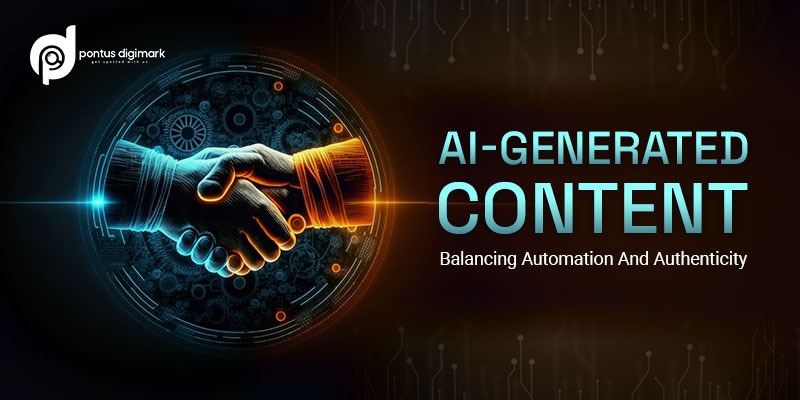Artificial Intelligence (AI) has become an indispensable tool, transforming various industries with its ability to analyze data, make predictions, and automate processes. One prominent application of AI is in content generation, where algorithms create text, images, and even videos.
While AI-generated content offers efficiency and scalability, there is an ongoing debate about how it impacts the authenticity of the information being produced. AI-generated content has the potential to revolutionize content creation by making it faster, cheaper, and more efficient.
However, the rapid pace of AI-generated content also raises concerns about authenticity, as the ease with which AI can create convincing fake news and propaganda has the potential to erode trust in the information we consume.
To address this issue, watermarking and other content-authentication technologies offer an approach to identifying AI-generated content that’s different from AI detection, which is done after the fact and has proved fairly ineffective so far.
While AI-generated content can be convenient and cost-effective, it is important to balance automation with authenticity to maintain trust in the information we consume. In this blog, we will discuss how we can implement AI into our digital marketing efforts and at the same time make it more authentic.
The Rise of AI-Generated Content:
AI has revolutionized content creation across diverse industries. From generating news articles to crafting marketing copy, AI algorithms have shown remarkable proficiency in mimicking human writing styles. Natural Language Processing (NLP) models like OpenAI’s GPT-3 have demonstrated an unprecedented ability to understand context, produce coherent text, and even engage in dynamic conversations.
With the recent AI-generated content surge in different sectors we can see chatbots answering customer queries to algorithms creating news articles, the technology has proven its capability to handle countless tasks. Content creators and businesses are leveraging AI to streamline their workflows, reduce costs, and reach wider audiences.
Benefits of AI-Generated Content:
- Increased Efficiency:
AI accelerates content creation processes, enabling businesses to produce large volumes of content in minimal time. This efficiency is particularly valuable in fast-paced industries where timely communication is crucial.
- Cost Savings:
Automating content creation reduces labor costs associated with hiring writers, editors, and proofreaders. AI-driven tools offer a cost-effective alternative for organizations looking to optimize their budgets.
- Consistency:
AI ensures consistency in messaging and tone across various pieces of content. This is especially beneficial for maintaining a cohesive brand identity in marketing and communication efforts.
Challenges in Maintaining Authenticity:
- Lack of Emotional Intelligence:
While AI can generate grammatically correct and contextually relevant content, it often lacks the emotional intelligence and nuanced understanding that humans bring to the table. This can result in content that feels impersonal or fails to resonate with the intended audience.
- Ethical Considerations:
The use of AI in content creation raises ethical questions, particularly regarding transparency. Audiences may be unaware that they are consuming AI-generated content, leading to concerns about manipulation and trust issues.
- Creativity and Originality:
AI models are trained on existing data, making it challenging for them to produce truly innovative or groundbreaking content. Authenticity can suffer when AI-generated work becomes formulaic and predictable.
Contact Pontus Digimark for innovative digital marketing strategies to enhance your brand visibility.
Striking the Balance Between AI & Authenticity:
- Human-AI Collaboration:
The key to maintaining authenticity lies in fostering collaboration between humans and AI. While AI can handle repetitive tasks and generate initial drafts, human creativity, emotional intelligence, and critical thinking are essential for refining and infusing authenticity into the content.
- Transparency:
Organizations should be transparent about their use of AI in content creation. Disclosing when content is AI-generated helps build trust with audiences, setting clear expectations about the source of the information.
- Customization and Personalization:
AI can be programmed to understand individual preferences, allowing for personalized content that resonates with specific audiences. This customization contributes to the authenticity of the user experience.
As AI continues to shape the future of content creation, finding the delicate equilibrium between automation and authenticity becomes paramount. Leveraging AI for efficiency and scalability should be complemented by human creativity, empathy, and ethical considerations.
By implementing a collaborative approach and prioritizing transparency, we can harness the power of AI-generated content while preserving the authenticity that makes human communication uniquely compelling. The future lies in a harmonious partnership between humans and AI, where technology enhances our capabilities without compromising the essence of genuine expression.







